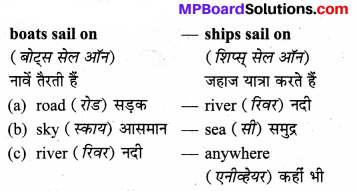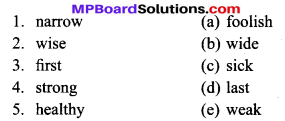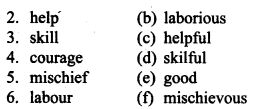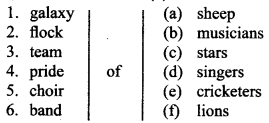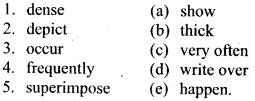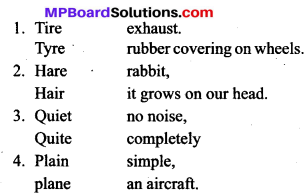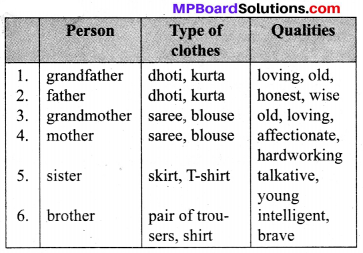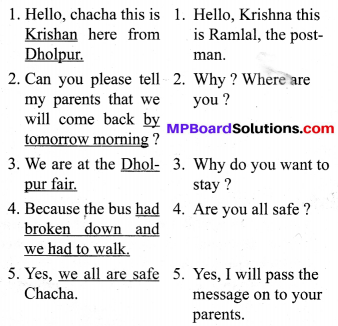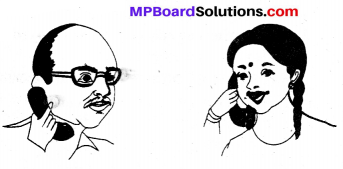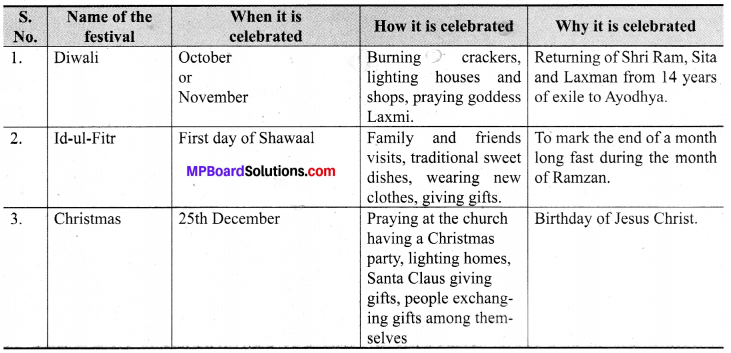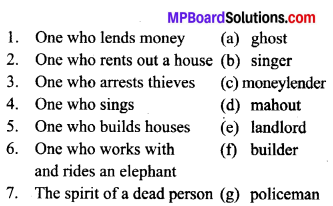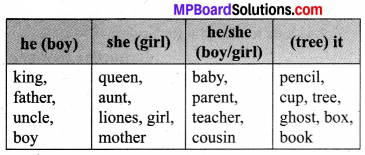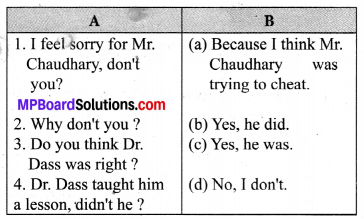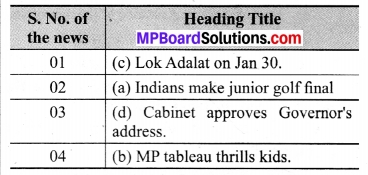Get Updated MP Board Solutions for Class 7 General English Revision Exercises 2 Questions and Answers in PDF Format and download them free of cost. These are provided as per the latest exam pattern and syllabus. Access the topics of Chapter wise and communication skills, grammer part through the direct links available depending on the need. You can Download MP Board Class 7 English Solutions and can score highest grade in examination. Clear all your queries on the Mp Board Solutions for Class 7 English Chapter 21 Tansen Questions and Answers Subject by using the Madhya Pradesh State Board Solutions for existing.
MP Board Class 7th General English Solutions Revision Exercises 2
If you are eager to know about the Madhya Pradesh State Board Solutions for Class 7 English you will find all of them here. You can identify the knowledge gap using these MP Board Solutions for English PDF and plan accordingly. Don’t worry about the accuracy as they are given after extensive research by people having subject knowledge along side from the latest English Syllabus.
Read and Learn : (पढ़ो और याद करो)
Students should do themselves.
Comprehension (बोध प्रश्न):
(A) Answer the questions given below :
(नीचे दिए प्रश्नो के उत्तर दीजिए)
Question 1.
What will the child do with the pussy ?
Answer:
The child will not pull pussy’s tail or drive her away but will play with her.
Question 2.
Why did the merchants think that the old man had seen the camel ?
Answer:
The merchants thought that the old man had seen the camel because he gave the real information to the merchants about their camel.
Question 3.
Where did the Olympic Games get their name from?
Answer:
The Olympic Games festival was for the first time held in Greece at Olympia. So this sports festival got its name from the place ‘Olympia’
Question 4.
Why did Dr. Dass want to buy Shanti Bhawan ?
Answer:
He wanted to buy Shanti Bhawan because it did not cost much.
Question 5.
Whom does the poetess invite to go in her rocket?
Answer:
The poetess invites her friend.
(B) Read the sentences given below and write True or False :
(निम्न वाक्यों को पढ़ो और सही या गलत पर चिन्ह लगाओ)
- The poetess doesn’t love little pussy. T/F
- The old man’s answers were in the form of questions. T/F
- Bobby Pearce’s father was a great wrestler. T/F
- Mrs. Ghosh was the owner of Shanti Bhawan. T/F
- The poetess wants to take her friend for a ride in her rocket. T/F
Answer:
- False
- True
- False
- True
- True.
(C) Read the given paragraph about Olympic Games and then write the answers to the questions given below.
(ओलम्पिक खेलों के बारे में दिए गए अनुच्छेद को पढ़िए और नीचे दिए गए प्रश्नों के उत्तर दीजिए।)
(a) Choose the correct answer :
(सही उत्तर चुनो)
Question 1.
Athletes who take part in the Olympics come from:
(a) one country
(b) all countries
(c) a few countries
(d) selected countries.
Answer:
(b) all countries.
Question 2.
Olympic Games are held :
(a) once in a year
(b) once in two years
(c) once in four years
(d) once in five years.
Answer:
(c) once in four years.
Question 3.
The best hockey players in the world are :
(a) Romans and Pakistanis
(b) Pakistanis and Japanese
(c) Indians and Romans
(d) Indians and Pakistanis.
Answer:
(d) Indians and Pakistanis.
Question 4.
Indians and Pakistanis are best players of hockey because they are more :
(a) skillful
(b) powerful
(c) strong
(d) practised.
Answer:
(a) skillful.
Question 5.
India lost championship in hockey for the first time :
(a) in 1956
(b) in 1960
(c) in 1964
(d) in 1962.
Answer:
(b) in 1960.
(b) What has brought honour to the nation ?
Answer:
The Olympic victories of our hockey players have brought honour to the nation.
(c) What are we in India proud of ?
Answer:
We in India are proud of our hockey.
(d) Why are Indians and Pakistanis among the best hockey players in the world ? :
Answer:
Because they are more skillful than all others.
Word Power (शब्द समर्थ):
(A) Write the homophones of:
(समान उच्चारित शब्द लिखिए)
(i) see ______
(ii) know ______
Answer:
(i) Sea
(ii) no.
(B) Write one word for :
(एक शब्द लिखिए)
(i) One who lends money
(ii) One who rents out a house
Answer:
(i) Moneylender
(ii) landlord.
(C) Match the column A with B :
(कॉलम A तथा कॉलम B को मिलाइए।)

Answer:
(i) → (b)
(ii) → (c)
(iii) → (a)
(D) Write the opposite of the following words:
(निम्नलिखित शब्दों के विपरीतार्थी शब्द लिखिए।)
(i) wild
(ii) sharp
Answer:
(i) domestic
(ii) blunt.
Grammar in Use (व्याकरण प्रयोग) :
(A) Frame questions using with ‘Where’, ‘Who’ and ‘When’ to get the following answers :
(‘where’, ‘who’, ‘when लगाकर निम्न उत्तरों के प्रश्न बनाइए।)
Question 1.
Who has her lunch at office ?
Answer:
Suman has her lunch at office.
Question 2.
When does she have her lunch?
Answer:
She has her lunch at 2 o’clock.
(B) Fill in the blanks with correct prepositions.
(उचित से रिक्त स्थान भरिए)
(by, into, across)
(i) I drew a line __________ the page.
(ii) Hemu jumped __________ the river.
(iii) Can you finish the work __________ five o’clock?
Answer:
(i) across
(ii) into
(iii) by
(c) Fill in the blanks with correct form of verb:
(क्रिया के उचित रूप से रिक्त स्थान भरिए।)
(i) Our Indian Cricket Team __________ the World Cup in 1983. (win)
(ii) There was complete silence outside. Suddenly I __________ a noise. (hear)
Answer:
(i) won
(ii) heard.
(D) Rewrite the following sentences in indirect form:
(निम्न वाक्यों को अप्रत्यक्ष कथन में लीखिए)
Question 1.
Seema asked Ashu, “What are you doing today?”
Answer:
Seema asked Ashu what was he doing that day.
Question 2.
Ashu said, “I am going to my grandmother’s place.”
Answer:
Ashu said that he was going to his grandmother’s place.
(E) Rewrite the following lines of poem using the necessary punctuation marks:
(आवश्यक विराम चिह्न लगाकर कविता की निम्न पंक्तियों को पुनः लिखिए।)
lives of all great men remind us we can make our lives sublime.
Answer:
Lives of all great men remind us, We can make sublime our lives.
Let’s Write (आओ लिखें):
(A) Write three sentences about the moon.
(चन्द्रमा के बारे में तीन वाक्य लिखिए)
Answer:
- The moon is a natural satellite of the earth.
- It looks very pretty on full moon night.
- Moon does not have light of its own.
(B) Write a short paragraph on ‘rainbow’ using the following words:
(निम्न शब्दों का प्रयोग कर ‘इन्द्रधनुष’ पर एक छोटा सा अनुछेद लिखिए)
rainbow, sky, rainy season, clouds, beautiful, pretty, colours
Answer:
A rainbow is seen in the sky in rainy season. Clouds that sail across the sky are pretty but rainbow is even prettier than these. It consists of seven beautiful colours like violet, indigo, blue, green, yellow, orange and red.
We believe the information shared regarding MP Board Solutions for Class 7 English Chapter 21 Tansen Questions and Answers as far as our knowledge is concerned is true and reliable. In case of any queries or suggestions do leave us your feedback and our team will guide you at soonest possibility. Bookmark our site to avail latest updates on several state board Solutions at your fingertips.
